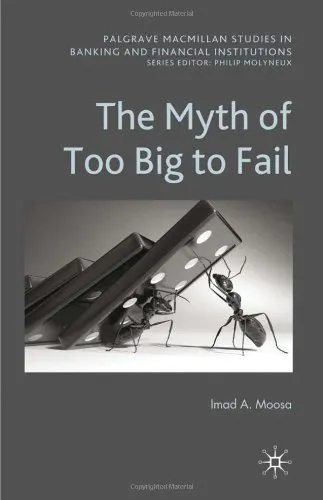The Myth of Too Big to Fail
4.0
Reviews from our users

You Can Ask your questions from this book's AI after Login
Each download or ask from book AI costs 2 points. To earn more free points, please visit the Points Guide Page and complete some valuable actions.Welcome to the comprehensive introduction of "The Myth of Too Big to Fail," a deep dive into one of the most prevalent narratives in modern finance. This book, penned by Imad A. Moosa, critically examines the widely-held belief that certain financial institutions are so large and interconnected that their failure would be catastrophic to the global economy. Here, we explore the subtleties and implications of this notion while challenging conventional thinking.
Detailed Summary of the Book
In "The Myth of Too Big to Fail," Imad A. Moosa challenges the narrative that certain financial institutions are indispensable to the stability of the global economy. The book methodically deconstructs the myth by drawing on historical instances, economic theory, and practical evidence. Moosa argues that the 'too big to fail' doctrine is often used to justify bailouts and other forms of financial assistance that ultimately reinforce risky behavior by banks and financial firms. Instead of protecting the economy, these practices encourage size and complexity, perpetuating systemic risk. This work urges readers to reconsider the rationale behind government interventions and to explore more robust regulatory frameworks that focus on reducing systemic risk rather than rescuing failing giants.
Key Takeaways
- The Flaws of Bailouts: Government bailouts, rather than preventing economic collapse, often exacerbate it by encouraging reckless behavior among financial institutions.
- Market Discipline: Establishing a system where financial firms are allowed to fail can restore market discipline and promote responsible behavior.
- Systemic Risk: The focus should shift from preventing the failure of large institutions to understanding and mitigating systemic risks in the financial system.
- Regulatory Reform: Effective regulatory frameworks are needed to manage institutional interdependencies and complexities, reducing the scale at which 'too big to fail' becomes a concern.
Famous Quotes from the Book
"The perpetuation of the 'too big to fail' myth is a convenient excuse for imprudent financial practices."
"True economic stability is achieved not by preventing failure, but by cultivating resilience and adaptability within the financial system."
"We must not confuse size with importance; a bigger institution does not equate to a more indispensable one."
Why This Book Matters
This book is essential for anyone seeking to understand the dynamics of financial crises and the role of government interventions in the financial sector. Its relevance extends to policymakers, scholars, and anyone interested in financial regulation and economic stability. By challenging the status quo, "The Myth of Too Big to Fail" encourages a re-evaluation of our current financial systems and advocates for a shift towards more sustainable and risk-aware economic structures. As financial landscapes continue to evolve, the lessons in this book remain pivotal to forging a future where market discipline and institutional accountability prevail over misguided protectionism.
Free Direct Download
Get Free Access to Download this and other Thousands of Books (Join Now)
For read this book you need PDF Reader Software like Foxit Reader
Accessing books through legal platforms and public libraries not only supports the rights of authors and publishers but also contributes to the sustainability of reading culture. Before downloading, please take a moment to consider these options.
Find this book on other platforms:
WorldCat helps you find books in libraries worldwide.
See ratings, reviews, and discussions on Goodreads.
Find and buy rare or used books on AbeBooks.


